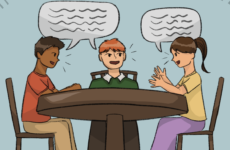Despite the circumstances of my busy life at Choate, I choose to fast every Ramadan because it is a customary practice for me and many of my family members. This decision often surprises people, and I am frequently asked, “Not even water?!”, to which I consistently respond, “No.”
Ramadan is a sacred month for Muslims, observed as the ninth month in the Islamic calendar. During this month, they fast from sunrise to sundown, pray, and dedicate themselves to their religion, while also having the opportunity to come together and share meals in celebration of their faith.
Before starting my fast, I begin my morning with a meal called suhoor to prepare my body for the day ahead. This is followed by a morning prayer, known as fajr, which takes place before sunrise. Afterward, I start my fast.
Personally, I prefer to sleep before suhoor and wake up around 4 a.m. to have my meal and perform my morning prayer; however, some Muslims opt to stay awake until suhoor and sleep only after starting their fast. I have my morning meal and prayer in my dorm room, and I typically eat food from the previous iftar (the meal to break fast during Ramadan), which is usually bananas from the dining hall. After the meal, I go back to sleep and commence my fast, which lasts until sunset.
Like any other student at Choate, I spend my day studying, attending classes, and taking occasional naps to recharge. Without these moments of rest, my body would feel completely drained, and I wouldn’t be able to function properly. I make it a priority to nap at least once each day.
Even though fasting throughout the day may seem like a challenging feat, it becomes easier with each passing day. The first day of fasting can be particularly tough because the stomach isn’t accustomed to it. However, it adjusts as the days progress, and you become more comfortable with the fasting routine. Eventually, you’ll find that you only need to eat a small amount during iftar to feel satiated.
Apart from the spiritual aspect, what helps me push through the passing thoughts of “it’s just water” or the occasional feeling of “hangriness” is the knowledge that this is the constant reality for numerous people. Many have to work under extremely harsh conditions, without access to water or sufficient food, for several hours at a time.
This realization reorients me towards what truly matters and keeps me grounded in my thoughts. It inspires me to strive to be a better person. As someone who is privileged enough to have access to what are considered basic necessities around the clock, why should I complain about being tired and hungry during an 8 a.m. math class?
While the month of fasting may not hold personal significance for the majority of Choate’s students and faculty, it carries immense importance for me and the nearly two billion Muslims worldwide. I believe it is essential for people to understand what Ramadan is and why it is significant. I know that many individuals are curious about this holiday and its meaning, so I urge you not to shy away from asking your friends. You will find that many Muslims love to discuss their cultural experiences and religion. I also encourage you to show empathy, and perhaps even challenge yourself to fast for a day! Choate provides a daily iftar at the Student Activities Center (SAC), so feel free to join us in fasting, coming together as a community, and engaging in meaningful conversation and connection.


